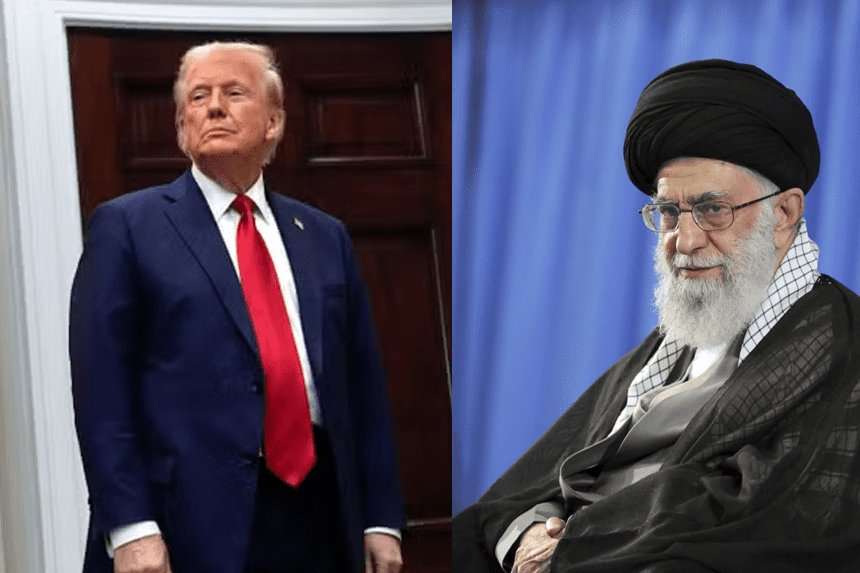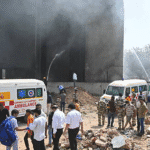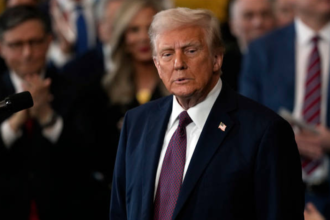A shocking action by former U.S. President Donald Trump has surfaced as hostilities between Israel and Iran get close to breaking point. Multiple government sources claim that Trump intervened to thwart a suggested Israeli assassination of Supreme Leader Ayatollah Ali Khamenei. This disclosure draws attention to a rare period of moderation amid Middle Eastern increasing conflict. Israel started strikes aimed at Iranian nuclear facilities, and Trump allegedly cautioned Prime Minister Netanyahu that this may set off unbridled events. The choice emphasizes the difficult balance world leaders have to strike between supporting friends and avoiding full-scale regional war. Trump’s assessment call is being reviewed as the situation changes for possible influence on security and diplomacy.
- What About the Middle East Crisis Did Trump’s Decision Reveal?
- What Inspired the Reported Rejection of the Plan for Khamenei Assassination?
- How Did Israeli Officials React to Trump’s Stance?
- Since the initial attack, what has been happening between Iran and Israel?
- What Public Role Is Trump Playing in the Crisis?
- Is American-Israel Coordination Fracturing Under This Crisis?
- What ramifications does this have for American Middle Eastern policy?
- How Could This Crisis De-escalate?
- How Things Are Right Now Ground-wise?
- Exist political fallout for Trump’s choice?
- The response of the international community?
- Final Thought: For the Region, What Does Trump’s Intervention Mean?
What About the Middle East Crisis Did Trump’s Decision Reveal?
The term captures a turning point when geopolitical strategy ran against caution. Credible U.S. officials claim that former President Donald Trump turned down a suggested Israeli plan to kill Ayatollah Ali Khamenei, the Supreme Leader of Iran. This behind-the-scenes rejection signaled a turning point in a fast-growing crisis between Israel and Iran. Although regional tensions have peaked, Trump’s stated decision makes a strong point: occasionally, even allies should be cautioned against possibly disastrous behavior. The action highlights the enormous authority a U.S. president has in global diplomacy as well as in domestic matters. In a time when conflict is all the buzz, this episode provides a rare moment of restraint amid anarchy. Here is the link to our article on Trump-Starmer Relations
What Inspired the Reported Rejection of the Plan for Khamenei Assassination?
Senior U.S. sources said that following a string of increasing military operations, Israel had suggested a deliberate assassination against Ayatollah Khamenei. Said to be telling Israeli Prime Minister Benjamin Netanyahu that the proposal was “not a good idea,” Trump cited worries about possible regional anarchy. The chat is thought to have happened just after Israel started its first attack on Iran’s nuclear facilities. Although Trump has not stated so, insiders believe the U.S. government aimed to avoid a direct clash capable of sparking a world war.
How Did Israeli Officials React to Trump’s Stance?
Israeli officials gave nebulous responses while not publicly endorsing the scheme. Prime Minister Netanyahu refrained from offering clear replies and discounted the media accounts as hypothetical. But stressing a focus on military and nuclear capabilities, an Israeli security official noted that Israel normally avoids attacking political leaders. This comment seems to justify the view that any scheme to eliminate Khamenei was only a backup, not a publicly approved one.
Since the initial attack, what has been happening between Iran and Israel?
Israel’s and Iran’s tensions have sharply escalated. Israel executed air attacks on multiple Iranian military and nuclear targets on Friday. Iran and its supporters responded with waves of missiles and drone strikes. Further escalation on the third day of fighting caused general concern of a more extensive regional war. Especially, the clashes caused planned U.S.-Iran nuclear negotiations to be called off. Omani intermediaries verified that Iran turned down participation even under attack.
What Public Role Is Trump Playing in the Crisis?
Trump is vocal even if he is not in office now. He demanded that Iran and Israel work on a peace agreement on Truth Social. In public appearances, he said the American government did not influence the start of the Israeli strikes. He cautioned Iran, nevertheless, that any attack directed against the United States would be greeted with force never seen before. This mix of diplomatic outreach and warning reflects his past global approach. His comment also emphasizes how powerful Trump is in world narratives, even in a private role. Here is the link to our article on the Starmer-Trump Meeting
Is American-Israel Coordination Fracturing Under This Crisis?
The debate on whether to aim at Khamenei could point to strategic coordination between the United States and Israel breaking under strain. Should confirmation be verified, Trump’s denial emphasizes the United States’ readiness to exercise veto authority over Israeli activities, perhaps sparking a full-scale conflict. This underscores how important American supervision is still in determining Middle Eastern policy. On the other hand, such a difference could potentially inspire animosity among Israeli hardliners who feel limited by American intervention.
What ramifications does this have for American Middle Eastern policy?
This claimed instance shows that Trump blocked the Iran strike not only for strategic reasons but also for more general signals. The U.S. seems to give stability top priority over risk-oriented behavior. American officials hope to stop erratic reprisals that would compromise soldiers, friends, or energy supplies by deterring regime assassinations. The incident might change the way allies show requests for coordinated actions and intelligence. It also creates precedence for future governments’ cautious approach over aggressiveness.
How Could This Crisis De-escalate?
Several calculated actions have to be taken to reduce the present Middle East conflict. First, diplomatic re-engagement is important. Restarts of nuclear discussions under the sponsorship of neutral nations should be given top priority by the United States and its allies. This can help to lower antagonism and provide a forum for communication. Second, by restricting what is regarded as a justifiable strike, specifying explicit target standards between opposing countries may help prevent hasty military escalations. Furthermore, promising is international mediation. Regional players like as Turkey, Oman, and Qatar might act as mediators, suggesting a peace-building model. Finally, open communication is essential. A well-defined U.S. policy posture can help to lower the possibility of mistakes and discourage Iran and Israel from acting carelessly.
How Things Are Right Now Ground-wise?
According to reports, drone strikes, civilian displacement, and constant damage to important infrastructure still occur. Israel maintained its position that its acts were required to stop Iranian nuclear advancement. Iran’s government, meanwhile, promises reprisals and says that peace cannot be sustained under attack. Every day, the humanitarian cost is growing. Unchecked, these tit-for–tat acts could snowball into regional conflict involving Syria, Lebanon, and the Gulf States.
Exist political fallout for Trump’s choice?
Alleged non-support of the strike could affect his political base as well as his worldwide profile. Among his fans, he may be considered a voice of reason, preventing pointless conflict. Critics would contend that his action confused diplomatic lines. Still, Trump’s blocking of Iran’s strike has already become a major topic of discussion as a turning point that deviates from the conventional wisdom supporting Israel at all costs.
The response of the international community?
Leaders all throughout the world are worried about the fast escalation. Members of the European Union have demanded moderation from all angles. China and Russia pushed non-intervention, but they nevertheless pursue their own geopolitical goals in the area. The United Nations called an emergency session; resolutions are non-binding, though. This suggests a lack of coordinated worldwide response, therefore hampering attempts at defusing conflict.
Final Thought: For the Region, What Does Trump’s Intervention Mean?
The Middle East still sits as a powder keg of military, political, and religious complexity. The knowledge that Trump blocked an Iranian strike gives the problem more subtlety. Under Trump’s influence, the U.S., instead of pushing open confrontation, appeared to encourage caution. This example indicates that even if the situation is getting worse, individual leaders still have the ability to stop conflict. Trump blocked an Iran strike at a critical moment, highlighting how restraint can be more powerful than retaliation. Middle East diplomacy’s future might very well rely on whether retaliation replaces reason or if restraint still directs strategic decisions.








